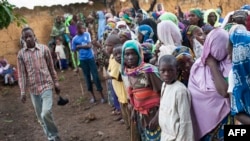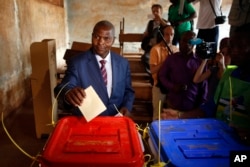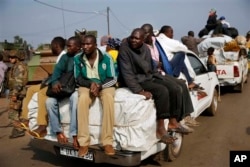Cameroon is home to more than 300,000 Central African Republic refugees who have been following with keen interest the presidential elections in their country. With Faustin Archange Touadera declared the winner, C.A.R. refugees in Cameroon have expectations for their new leader and the peace process in their troubled country.
Belmont Vieux Osee, former lecturer at the University of Bangui, now a refugee in Garoua Boulaye, eastern Cameroon, campaigned for Anicet Dologuele to become C.A.R. president. The 52-year-old says although his candidate did not win, he is urging president-elect Faustin Archange Touadera to immediately work for peace.
He says the president-elect should first of all assemble all the republic's citizens because the country has so many problems. He says it is imperative for Touadera to make sure that schools reopen fully and civil servants start working. He says in other to achieve this, the new president should invite all religious, political and community leaders to a negotiating table. He says since the elections were peaceful, his wish is that peace should return to the country.
Djodiar Kato, follower of former C.A.R. president Bozize who was represented at the election by Anicet Dologuele says former prime minister Touadera's victory indicates C.A.R. is not ready for reconciliation and he is not sure any one who supports his views will have peace should they return to C.A.R.
He says those who fought wars in C.A.R. alongside former president Bozize have been declared wanted everywhere in the world and as such they are not sure of their security adding that is better for them to remain hiding in Cameroon. He says they can not find peace if they go back to their country.
Toudera Bienvenue says even though his candidate, Faustin Archange Touadera, was declared successful many of his supporters are still reluctant to return to C.A.R.
He says the first thing they need is peace and if there is no peace in C.A.R., they will not return. He says even if there is peace, the decision to return should be individual because some of them who escaped had lost every thing in the war and should not be forced to return. He says it will be unwise to ask a family head who has lost all of his belongings to return because he will not be able to feed his children and send them to school.
C.A.R. has had a history of unrest since it gained independence from France in 1960. The crisis that the presidential election is expected to solve began after Muslim Seleka rebels overthrew President Bozize in March 2013. Abuses by the rebels triggered the rise of the Anti Balaka Christian defense groups and began a cycle of killings and violence.
After former rebel leader Michel Djotodia who took over from Bozize resigned, the mayor of Bangui, Catherine Samba-Panza, was elected interim president untill presidential elections were organized.
Cameroon and C.A.R. created a joint commission to encourage refugees to return. Cameroonian born Ekodo Roland Yannick who works for the joint commission says many of them are reluctant to go back because they have lost every thing in the war.
He says he does not think that they will be willing to return to C.A.R. this early. He says they want to remain in Cameroon or go elsewhere and some of them have been applying to the United Nations High Commissioner for Refugees to take them to countries like Canada and the United States of America where they think they will find peace and jobs which they say is better than going back to their country where they have lost their relatives and loved ones.
C.A.R. suffered more than two years of sectarian fighting that left thousands dead and forced nearly 500,000 people to flee to neighboring countries with about 300,000 in Cameroon.
After C.A.R.'s national elections body announced that former prime minister Faustin Archange Touadera had won the country's presidential election with 63 percent of the ballots cast, main rival Anicet Dologuele, another former prime minister, accepted the results, sparking hope that peace might at last return to the troubled country.






